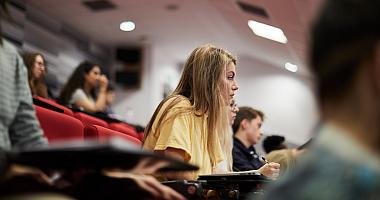BA (Hons)
Politics
Content navigation menu
Why study BA Politics at Goldsmiths
Politics encompasses the most difficult challenges faced by humanity today. Learn how to evaluate and engage with these challenges in a sophisticated, persuasive way.
- More than just the study of government, this politics degree examines the ways in which we understand and communicate about the problems we face, and the formal exercise of power.
- A degree in politics is one of the most rewarding and enjoyable subjects you can study at university. And the skills you’ll gain will stay with you forever. This programme extends beyond the conventional – we'll look at how and why politics is practised in such different ways around the planet.
- You will develop your critical and analytical skills, and you'll gain a thorough grounding in the major aspects of modern political studies, including political theory, international relations, political economy, British and European comparative politics and the politics of non-Western countries.
- Through a study of diverse topics, such as feminism, foreign policy, and human rights, you'll sharpen your ability to evaluate complex, challenging claims.
- Our research interests are as diverse as the discipline of politics; you’ll have the option of studying from the full range of subjects that we offer (subject to prerequisites).
- You’ll learn about the politics of the Houses of Parliament and the United States Senate, but you’ll also learn about the political decisions that take place in the classroom, the company directors’ meeting, the art gallery and the internet forum. Through these (and more) diverse studies, we’ll help you to question your own assumptions and beliefs in order to give you the ability to question the assumptions and beliefs of others.
- In your third year you’ll be able to put these skills into practice in our Work Placement programme. We have links with the Home Office, Department for Transport, local government and the European Commission.
- We have a lively events programme that attracts renowned speakers, so you'll have the opportunity to hear (and challenge) the latest political arguments, theories and ideas.
Contact the department
If you have specific questions about the degree, contact Professor Saul Newman (for information about applying).
UCAS code
L200
Entry requirements
A-level: BBB
BTEC: DDM
IB: 33 points overall with three HL subjects at 655
Length
3 years full-time
Department
Watch videos about this course
What you'll study
You will study the following compulsory modules:
| Module title | Credits |
|---|---|
| UK and European Comparative Governance and Politics | 30 credits |
| Political Theory and Ideologies | 30 credits |
| Identity, Agency & Environment 1 | 15 credits |
| Identity, Agency & Environment 2 | 15 credits |
| World Politics | 30 credits |
Note about optional modules (if available): The above is indicative of the typical modules offered, but is not intended to be construed or relied on as a definitive list of what might be available in any given year. The module content and availability is subject to change.
Work Placement module
This optional module gives students experience of working in a range of organisations in the NGO sector such as charities, think-tanks and pressure groups, bodies connected with international organisations, appropriate businesses, and political parties.
Teaching style
This programme is mainly taught through scheduled learning - a mixture of lectures, seminars and workshops. You’ll also be expected to undertake a significant amount of independent study. This may include carrying out required and additional reading, preparing topics for discussion, and producing essays or project work.
How you'll be assessed
You’ll be assessed by a variety of methods, depending on your module choices. These include coursework, examinations, group work and projects.
What our students say

Entry requirements
We accept the following qualifications:
A-level: BBB
BTEC: DDM
International Baccalaureate: 33 points overall with three HL subjects at 655
Access: Pass with 45 Level 3 credits including 30 Distinctions and a number of merits/passes in subject-specific modules
Scottish qualifications: BBBBC (Higher) or BBC (Advanced Higher)
European Baccalaureate: 75%
Irish Leaving Certificate: H2 H2 H2 H2
Alternative qualifications
See our full list of undergraduate entry qualifications.
We welcome students with a range of educational experiences. If you believe you may not meet the standard qualification requirements we would still encourage you to apply because we consider all aspects of your application when making a decision.
We’ll pay particularly careful attention to your personal statement, which is your opportunity to demonstrate your interest in the subject you’ve applied for. Your referees are also welcome to include any relevant contextual comments around your academic achievements. We’ll look at all these things when making a decision on your application, as well as your qualifications and grades, and may still be able to offer you a place.
International qualifications
We also accept a wide range of international qualifications. Find out more about the qualifications we accept from around the world.
If English isn’t your first language, you will need an IELTS score (or equivalent English language qualification) of 6.0 with a 6.0 in writing and no element lower than 5.5 to study this programme. If you need assistance with your English language, we offer a range of courses that can help prepare you for degree-level study.
Fees and funding
Annual tuition fees
These are the UG fees for students starting their programme in the 2024/2025 academic year.
- Home - full-time: £9250
- International - full-time: £19640
If your fees are not listed here, please check our undergraduate fees guidance or contact the Fees Office, who can also advise you about how to pay your fees.
It’s not currently possible for international students to study part-time if you require a Student Visa, however this is currently being reviewed and will be confirmed in the new year. Please read our visa guidance in the interim for more information. If you think you might be eligible to study part-time while being on another visa type, please contact our Admissions Team for more information.
If you are looking to pay your fees please see our guide to making a payment.
Funding opportunities
We offer a wide range of scholarships and bursaries, and our careers service can also offer advice on finding work during your studies. Find out more about funding your studies with us.
Additional costs
In addition to your tuition fees, you'll be responsible for any additional costs associated with your course, such as buying stationery and paying for photocopying. You can find out more about what you need to budget for on our study costs page.
There may also be specific additional costs associated with your programme. This can include things like paying for field trips or specialist materials for your assignments. Please check the programme specification for more information.
Careers
Where your degree could take you
Our graduates go on to a wide variety of careers. Some go on to postgraduate study or further training in law, accountancy, social work, business administration, or to specialise in one area of their academic studies, whilst others go directly into employment.
Recent graduates have found employment in:
- Administration and management
- Departments of central and local government
- Finance
- The media
- Research and computing
- Voluntary agencies
- Health
- Education as lecturers and teachers
- Housing management
- The probation service
- Company management
You can find out more about the career paths open to you after graduating on our Politics and International Relations careers page.
Find out more about employability at Goldsmiths.
Skills
This programme will develop you intellectually, and will enhance your transferable and communication skills – learning to plan your workload, to research solutions, and to express your ideas coherently.





